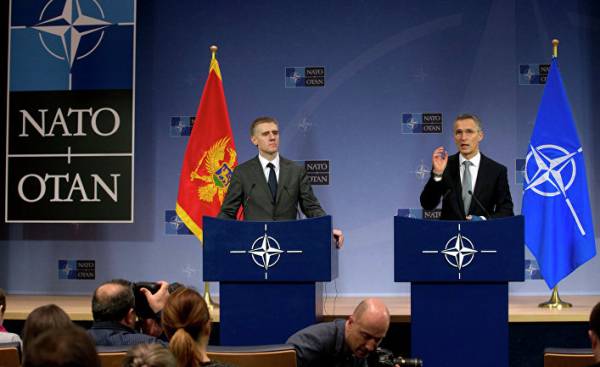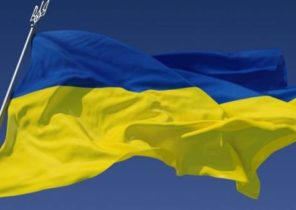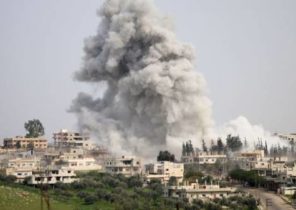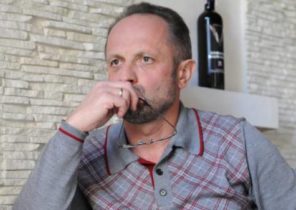
On his first meeting with NATO on Thursday, the President of the United States immediately set to work.
He turned Secretary General Jens Stoltenberg at the collector in relation to those members of the Alliance who do not pay 2% of their GDP to NATO. Tried to connect NATO to the war against terrorism. Declined to give assurances that the US is faithful to article 5, the so-called musketeer article that “one for all and all for one”, and pushed Dusko Markovic, the Prime Minister of a new member of the Alliance of Montenegro — side in order to make clear who’s boss.
How rigidly treated with Markovic in the capital of Montenegro is Podgorica, the former Titograd, did not go unnoticed. The question of NATO membership is a bone of contention in the former Yugoslav Republic, which broke from Serbia in 2006, which is located in a paralyzing political crisis — in the same way as another former Yugoslav Republic, Macedonia.
FIELD OF TENSION — THE BALKANS
Membership in NATO and different degree of proximity to the EU makes the Balkans area of conflict of interests with Russia. The country has a common Slavic ties with Serbia, which aspires to EU membership, NATO membership of Bulgaria and the new member of NATO Montenegro.
“The new reality in the Balkans is that Europeans can no longer rely on the US to ensure peace and stability in the region”, wrote in the Financial Times March 16, Ivan Krastev, head of the Bulgarian Centre for liberal strategies in Sofia. “This lack of interest from Washington explains why in the Balkans more than the Baltic countries, Moscow will be tempted to emphasize the vulnerability of NATO.”
In addition, in a field of tension in the Balkans it includes NATO member Turkey, which is now included in nessasery Alliance with Russia in Syria. This leads to conflict of interests, in which “the EU needs to be ready to make the Balkans a priority of its geopolitical and there to form a political conflict as a struggle for or against Europe,” says Krastev.
THE ACCUSATIONS AGAINST THE KREMLIN IN THE COUP ATTEMPT
Montenegro occupies an important strategic position on the Adriatic sea and can easily gain access to the Mediterranean sea. Country that is smaller than the County of Buskerud (one of the 19 counties of Norway — approx. ed.), is a mountainous buffer between areas of different interests, which have deep historical roots in the Balkans where Yugoslavia in the 20th century existed only in parentheses. Montenegro, which is a lot of routes of smugglers, after 2006, became interested in the many Russian investors and tourists, here we can see how Russian interests and Russian influence. On the coast settled a lot of Russian.
In October, all this suddenly came to an end when the authorities accused the Kremlin of what he stands for Pro-Russian and anti-NATO group, which allegedly attempted anti-government coup and eliminated the Prime Minister, Milo Djukanovic. Montenegro became “a testing ground for a geopolitical confrontation”, according to Milan Knežević, one of the MPs allegedly behind the so-called “terrorist group”. In April, a spokesman for the Russian foreign Ministry Maria Zakharova warned of “the resurgence of anti-Russian hysteria” in Montenegro. Then the figures said that Russian tourism has become reversed: the flow of Russian tourists in March was 7.3% of all tourists, compared to around 30% in March 2014 and 19.2% in March last year.
Today, all the opposition parties are boycotting Parliament, political analysts are concerned that NATO membership will deepen the political crisis, becoming a destabilizing effect “within the country, since the society to this issue, the attitude is very ambiguous,” says James Sawyer (James Sawyer) from the Eurasia Group, in an interview with Reuters.
PIPELINES
18 Nov Markovic has replaced Prime Minister Djukanovic, they both represent the Democratic socialist party, and took the “NATO project”, since “our strategic position is very important, especially the Adriatic sea,” said Markowitz, according to Reuters.
This was the first NATO enlargement after Croatia in the old area of the German-Austrian interests of Small Central Europe and Albania became members in 2009. Other countries also want to join NATO, but not of Serbia, which remains neutral.
The political conflict in Macedonia, in particular, is associated with the political interest of superpowers seeking to put through the Balkans gas to the EU market. The pipeline through Macedonia on the map can be seen in several ways: either from Russia through the Black sea and through Bulgaria or Turkey.
Now besides Israel has shown interest in construction of a gas pipeline through Cyprus and Greece to export gas from the Leviathan field in the Eastern Mediterranean, where Israel and Lebanon are in conflict over Maritime borders.
Given the “entry” of NATO and the growing scepticism about the EU project in Western Balkans, many Russian and Chinese economic interests, the region may soon once again become a zone of conflict.







